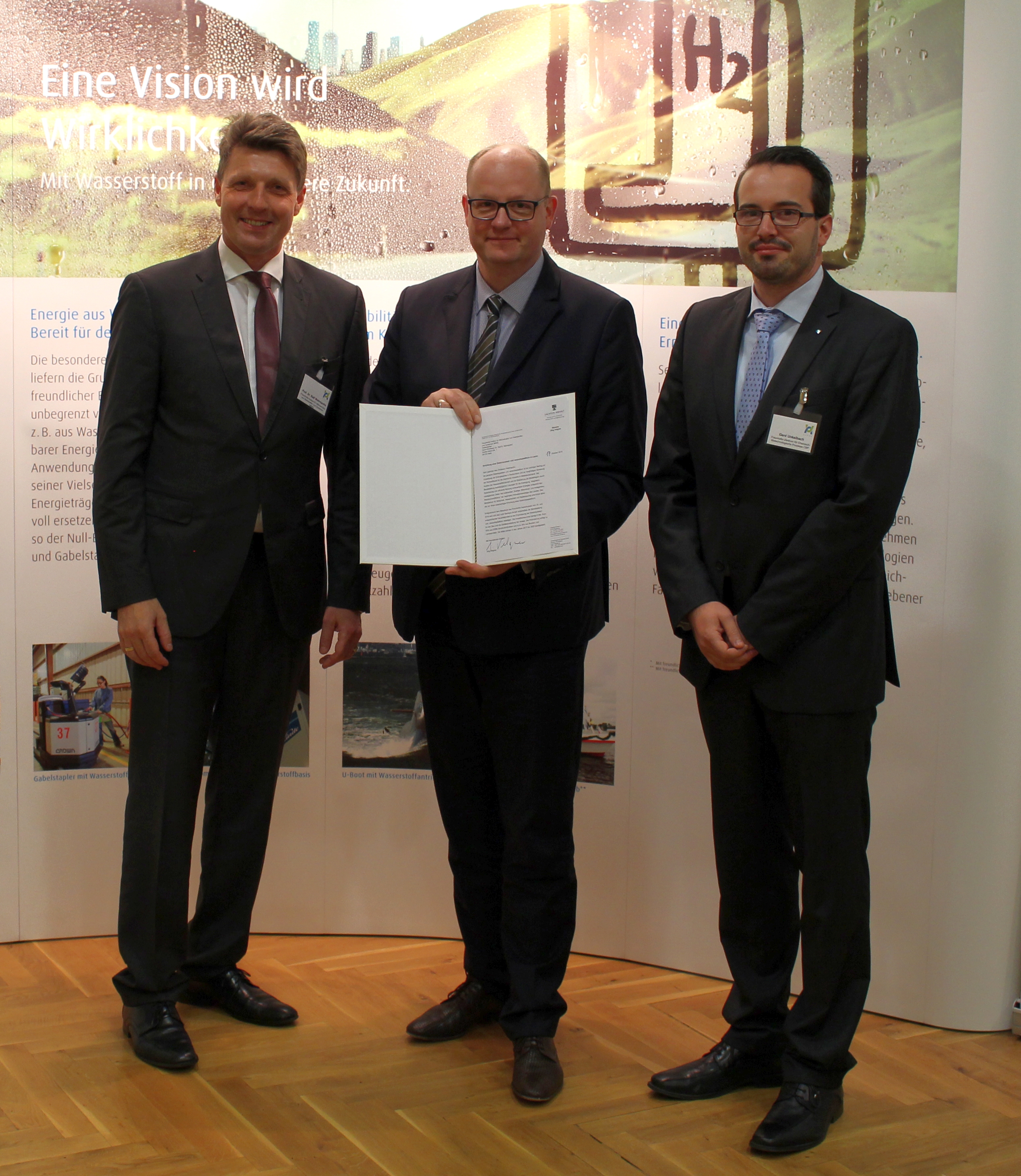Fresh impetus for the German turn of energy policies: Electrolysis test platform being built in Leuna
Future use of »green« hydrogen, which is produced from by means of electrolysis and by using renewable energy, is a decisive pillar for successful implementation of the German “Energiewende” (exit from nuclear and fossil-fuel energy sources). Saxony-Anhalt is leading the way to this goal: Jörg Felgner, Minister of Economy, Science and Digitization, yesterday handed over the State’s declaration of intent to contribute to the funding of the electrolysis testing platform in Leuna. The plant is planned to prepare the way for a sustainable chemical industry from 2019.

With electrolysis, electricity from renewable energy can be used to split water into oxygen and hydrogen. The latter not only offers large potential as an energy store, but is also a raw material that is very much in demand for the chemical industry. »Green« hydrogen can be a decisive component for the decarbonization of the chemical industry – its production and use are to be pushed ahead in the planned electrolysis test platform.
The platform has been conceived as a joint research unit of the Fraunhofer Institute for Microstructure of Materials and Systems IMWS in Halle and the Fraunhofer Centre for Chemical Biotechnological Processes CBP in Leuna. Its location, in the central German “chemicals triangle”, which already has the second largest hydrogen pipeline network in Germany, offers decisive advantages: Attractive possible uses for »green« hydrogen will result for the local companies. At the same time the future technical-economic relevance of such plants can be tested on a large, industrial scale, to then make them marketable through supporting research and development work.
»The planned electrolysis platform is indeed an investment in the future. At the very traditional chemical location Leuna, innovative technologies for the production of green hydrogen are linked with the excellent infrastructure of gas pipelines and gas storage systems. The pilot plant, funded by the State, will provide fresh impetus for Germany's so-called “turn of energy policies” and will also prepare the way for sustainable raw material supply for the chemicals industry«, said Minister Felgner on handing over the funding pledge.
With the platform, which will be connected to the existing pipeline network, an opportunity is also being created to use the surplus regional electricity available and increasing in Saxony-Anhalt in a value-adding way. The new research facility is planned to include offices, laboratories, a pilot plant facility with an area of 300 m2 and an additional outdoor standing area for container solutions. Among other things, the intention is to further develop the reliability of electrolysis systems, for example, through detailed characterization of the materials used. The design of electrolysis systems in combination with wind turbines or photovoltaic systems will also be examined, and it is also planned to develop new electrolysis equipment.
»With the electrolysis platform, we are creating the first fully-integrated electrolysis test bed in a chemical material flow network in Germany. This enables the systematic testing of electrolyzers up to 10 megawatt initially, with direct pipeline feed-in into the pipeline system of our cooperation partner Linde. This platform will be available to all electrolysis manufacturers and their suppliers for projects from 2018«, said Prof. Ralf B. Wehrspohn, Head of the Fraunhofer IMWS.
»The companies in Central Germany alone have a need for around 100,000 standard cubic meters of hydrogen per hour. If this important raw material, which until now has been produced from natural gas, can be produced in situ using renewable energy, this will mean important progress with regard to the security of supply and sustainability. To increase the value added in the region, we also want to contribute new solutions for the use of hydrogen as a chemical energy store or in downstream chemical processes«, said Gerd Unkelbach, Head of the Fraunhofer CBP.
Construction is due to start in 2018, the plant in Leuna can then start operation the following year. In total, 6 million euros are being invested in the electrolysis test platform.